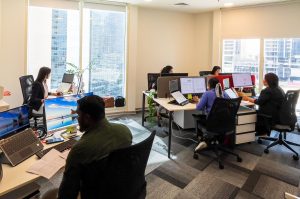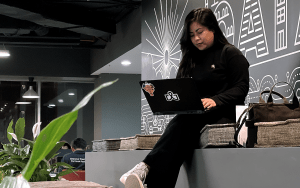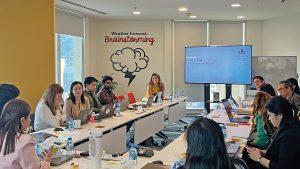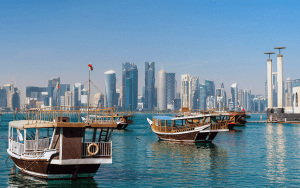New Year’s Eve in 2019 was a celebration around the world as we welcomed the start of a brand-new decade. For many, it was a hopeful time, a year of new beginnings, planning, and building the future. Amidst all those celebrations, none of us would have predicted the global turmoil that would soon fall upon us in only a few months’ time. And to be completely fair, we were never prepared for it either.
The COVID-19 pandemic has claimed lives and livelihoods of thousands of people across the globe. As the statistics of the novel coronavirus grew, we were reminded more than ever of how little we could do to stop it, despite our 21st century scientific advances.
2020 has been a tough year for many but maybe it’s what we needed all this time. Perhaps, the lack of treatment and preventive methods to control the outbreak served as a lesson for all of us in setting our priorities, our duty to the human race at large, and the need for more aggressive healthcare developments to prevent another pandemic down the road.
It may not be possible to prevent a disease outbreak, but it may very well be possible to prevent it from becoming a global pandemic.
The same applies for preventing a second peak in the COVID-19 pandemic. Taking timely measures, working together as a global community, and modifying our lifestyles could just protect us from the oncoming threat of a second peak.
#1: Contribute to vaccine development programs
Although the development of a vaccine is handled by the government and related scientific organizations, you and I can also partake in its development process. The easiest way to do this is by investing and funding to these developmental programs so that they can have a vaccine ready more speedily should a new disease arise.
In the case of the novel coronavirus, the lack of vaccine funding was one of the biggest setbacks and contributors to the disease becoming so widespread. Although vaccine development has now accelerated, it can still take a couple of months for an effective and safe vaccine to be available to the public.
As a community, our financial contribution to vaccine development might just help this expected time to shorten. It’s also important to continue contributing to primary preventive health programs even after the coronavirus pandemic subsides so that we can respond to future pandemics more quickly.
#2: Practice hygiene
Hygiene plays a gigantic role in the spread of communicable diseases and it has been since the start of time. Poor hygiene is a key risk factor for spreading illnesses and increasing disease incidence in a community.
Ever since the coronavirus pandemic started, there has been a stark change in our lifestyles – no longer do we cough or sneeze without covering our faces and no longer do we move anywhere without a handy sanitizer.
Personal hygiene could play an important role in keeping another pandemic down the road at bay. Now that we’ve been told to ‘live’ with the disease, it’s important to make these acquired hygiene skills – 20 seconds of handwashing, disinfecting and sanitizing surfaces, and wearing masks – a part of normal lifestyle.
#3: Follow the rules set by your government
One of the biggest challenges in controlling the coronavirus pandemic was not the authorities acting late or carelessly to it, but the people. Most governments around the world laid down special rules and instructions on what to do to prevent the spread of the disease; some like New Zealand and Spain enforced strict lockdown measures while others like Sweden left it up to the people to follow preventive measures.
As it turns out, the government can’t actually control the spread of a disease unless the community is ready to control it. It’s important to follow the international and national guidelines to controlling a disease on a personal level.
Abiding by these rules is probably the single most crucial method to prevent a second peak in the coronavirus pandemic and to prevent another pandemic in the future.
#4: Be cautious but don’t panic
There have been multiple pandemics in the past but none like the COVID-19 for a number of reasons. One of the biggest reasons why this pandemic become a global emergency so rapidly is because of the media outreach. With information available to just about anyone in the world at the speed of light, the news of the new disease and its consequences spread like wildfire.
It’s true that when it comes to communicable diseases, it’s better to overreact than underreact. However, this does not mean that you should panic or believe any information you read online.
This includes believing the entire pandemic is a hoax or some sort of conspiracy theory to believing that the coronavirus has an extremely high death rate and can kill anyone who gets it.
If you’re going to the internet to get your information, make sure to follow up on the sources of the information. This is a pivotal way to stop the spread of misinformation in times of a global pandemic and a responsible attitude towards dealing with the problem may help to tackle a future disease outbreak as well.
Bottom Line
What started out as a simple flu back in December 2019 in a city called Wuhan has now progressed into a pandemic that has rocked the entire world. The good news is that many countries have started to flatten the curve and gained momentum over the viral infection but there’s still a looming threat of a second peak that could happen in the winter season.
Let’s act together as a community and prevent such a consequence from ever happening, even if it means changing our comfortable lifestyles a little. At the end of the day, our small contributions to the community could just prevent another global health crisis in the future.



































